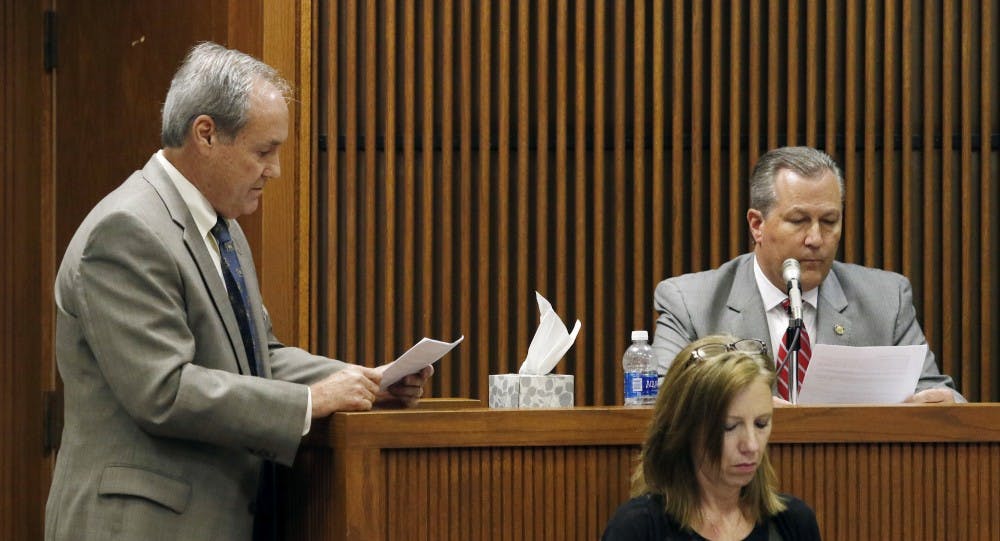After two years of review, the Alabama Court of Criminal Appeals has upheld all but one of former Alabama House Speaker Mike Hubbard's felony ethics convictions.
The ruling from the Court of Criminal Appeals marks a victory for the Attorney General's Special Prosecutions Division and a temporary end to a two-year waiting game as the court decided how to deal with the Auburn Republican's appeal.
"I'm shocked. That's all I can say," said Bill Baxley, Hubbard's lead defense attorney.
Baxley said the defense team plans to appeal the ruling to the state's Supreme Court.
A Lee County jury found Hubbard guilty of 12 violations of the state's ethics laws in June 2016. He was sentenced to serve four years in state prison in July 2016, though he has been out on an appeal bond since then and hasn't served any prison time.
It isn't yet clear when that bond will be revoked if he appeals to the Supreme Court and when Hubbard will start his prison sentence.
Hubbard served as House speaker, considered by many to be Alabama's most powerful political position, from 2010 to 2016, when he was automatically removed from office because of the ethics convictions. Felons are not allowed to serve in the Alabama Legislature.
Before becoming speaker in 2010, Hubbard served as Auburn's state representative beginning when he was elected in 1998.
The Alabama Ethics Law governs the behavior of legislators, other public officials, lobbyists and principals (people or businesses who employ lobbyists).

Hubbard was found guilty of using his office for personal gain in the form of jobs and investments into his businesses from lobbyists and those who employ them.
They're also the same laws that Hubbard himself championed during his first special session as speaker in December 2010. Hubbard and his Republican allies won control of both chambers of the Alabama Legislature in 2010 for the first time since the Reconstruction Era after running largely on ethics reform.
In their 154-page majority opinion, the court overturned only one of Hubbard's convictions — Count 5. That count covered Hubbard voting on a bill with which he had a conflict of interest. The remainder of the counts were affirmed, as was his sentence on those charges.
During his Lee County trial, prosecutors said Hubbard voted on the state's 2014 Fiscal Year General Fund Budget despite it containing language that would benefit a trade organization with which he had a consulting contract. He was being paid $5,000 a month by the American Pharmacy Cooperative Inc., the trade organization based in Bessemer, Alabama, representing small and independent
Hubbard said during the trial that he did not know the language in the General Fund was specific to the cooperative, he thought it would only ensure that "mom and pop pharmacies" would not be pushed out of the Medicaid business as the agency considered a large commercial pharmacy benefits manager.
PBMs are third-party organizations which provide services to the state to help with purchasing power and contain costs for the state's Medicaid system. PBMs handle all of the buying and selling of drugs to the
In reality, prosecutors said, the language contained in the General Fund would have instead required the agency to "analyze" the possibility of using a PBM, but it set requirements for the possible PBM that only APCI could meet. Other possible PBMs could not be considered because of the requirements listed.
APCI crafted statutory language that required any PBM to represent 30 percent of the retail pharmacies in the state, and only APCI would satisfy that requirement.
Judges wrote that prosecutors argued Hubbard was an "employee" of
"We have no difficulty determining that Hubbard was not an employee of APCI's and that, as a result, the State failed to present any evidence indicating that he had a conflict of interest as that phrase is defined in § 36-25-1(8)," the court wrote in their opinion.
In an unusual turn of events, the Court of Criminal Appeals urged the Alabama Legislature to amend the state's ethics laws to make them more clear.
"The language of Alabama's ethics law should be clear as to which persons, businesses, and acts fall within its reach," the court wrote in its majority opinion.
Mike Hubbard Appeal Opinion by Chip Brownlee on Scribd
This story will be updated with more information.
Do you like this story? The Plainsman doesn't accept money from tuition or student fees, and we don't charge a subscription fee. But you can donate to support The Plainsman.

Chip Brownlee, senior in journalism and political science, is the editor-in-chief of The Auburn Plainsman.





